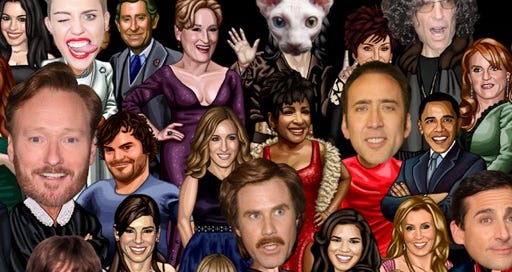Fame is now available to all, according to Chris Hayes, who has a show on MSNBC. And he thinks this can be a problem. And it is all social media’s fault.
In a sense, everyone is a pop star through the use of their social media.
In Hayes’ insightful essay on The New Yorker, he says,
“Never before in history have so many people been under the gaze of so many strangers. Humans evolved in small groups, defined by kinship: those we knew, knew us. And our imaginative capabilities allowed us to know strangers—kings and queens, heroes of legend, gods above—all manner of at least partly mythic personalities to whom we may have felt as intimately close to as kin. For the vast majority of our species’ history, those were the two principal categories of human relations: kin and gods. Those we know who know us, grounded in mutual social interaction, and those we know who don’t know us, grounded in our imaginative powers.”
The idea that strangers know us, and we may not know them, creates an uneven balance that used to be only in the realm of celebrities. It is more than just being subject to gossip. It being under the gaze of others.
Thus, Hayes says, The Era of Mass Fame is upon us.
He writes,
“In the same way that electricity went from a luxury enjoyed by the American élite to something just about everyone had, so, too, has fame, or at least being known by strangers, gone from a novelty to a core human experience.”
I think this is particularly true of youth, who have access to fame without cultural gatekeepers. While the song says, “video killed the radio star,” social media has given life to a new star. It’s not just the time of the selfie.
It is the time when YOU are the star.
Leaving the fact that this can lead to narcissism aside, we know that people seeking fame feel an incredible amount of insecurity and it rarely leads to happiness. It’s the annoying refrain we hear from celebrities, who bemoan the scrutiny of fame while enjoying its privilege.
But cultural gatekeepers kept fame as a minority. Often fame is just an illusive experience. But, now, anyone can be an influencer, have a notable name, or gain attention through social media.
It’s the almighty algorithm that makes it possible, rather than those gatekeepers in traditional media. It’s the most democratized notion of fame.
But, it is also perhaps more addictive because it is so random.
The intermittent conditioning that you get with a slot machine, where you keep feeding it quarters in hopes that it randomly spews out a win. It’s much stronger than if you got a win at every turn.
And thus you have people addicted to not only fame, but the hope that the algorithm gods look down at you with favor.
I see this in my own 5-year-old child, wearing sunglasses and saying “I’m famous.” She doesn’t know what that means. She just knows it’s a cultural value. And she also knows it’s something that’s totally available to her. The YouTube stars she follows are ordinary people with cameras. It’s my daughter’s gaze that makes them famous. And it’s a gaze she can easily achieve on her own through social media.
So, if we have a youth that is growing up under the gaze of others, what do we do? Do we see it as a necessary evil or cut the head of that monster off. I think we can only hold off that gaze for so long, if we do try.
All youth will eventually have access to that fame.
We adults can only be gatekeepers for so long. Whether we like it or not, our kids will grow up into pop stars.
Hayes’ essay gives no answers. His modicum of fame is made possible by cultural gatekeepers, so we have to take his siren call with a grain of salt. He is too old too speak to the next generation. His warning serves more to alarm my generation, and we are the pop stars “momagers” at most.
And the next generation knows nothing else, but this gaze.
They ARE famous.
They will not know obscurity. Pandora’s box has already been opened.
So, rather than seeing this as a problem to be solved, all we can do is help our youth navigate that fame. And let them ultimately guide us through it as well. The era of mass fame is upon us. So let’s learn to live through it well.
—Melissa













Share this post